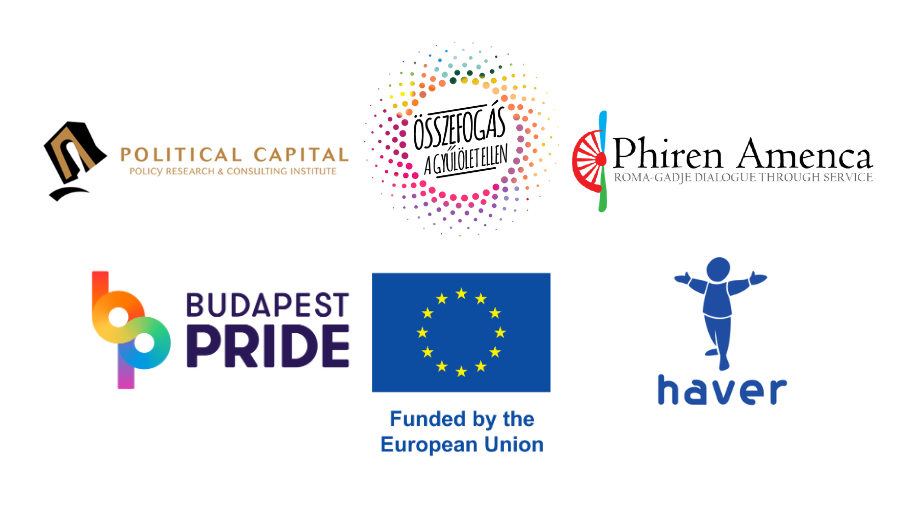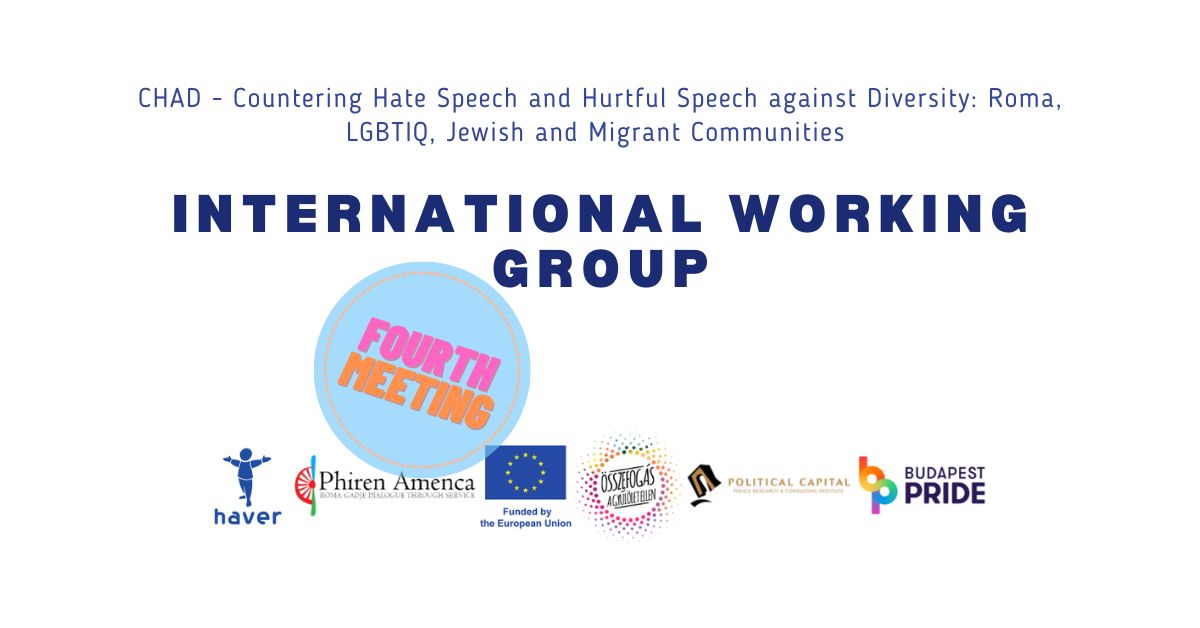March 29, 2023 – Online
The international working group, formed in the frame of the CHAD project, had its fourth meeting on 29.03.2023. The meeting aimed to provide an overview for the project participants regarding hate speech in Poland, Serbia, and Bulgaria. Furthermore, one of the presenters introduced a new software tool which could be extremely useful for all those researching and reporting on hate speech.
Summary of the presentations
Artificial intelligence tool to tackle online hate
The presenter introduced an artificial intelligence tool that can analyse online hate speech. The tool categorises and ranks data regarding the toxicity of thousands of hateful words in 24 languages. It is engaged in various projects, some supported by the European Commission, one of which monitors 15 social media platforms in all 24 EU languages and involves several stakeholders and experts. Anyone with access can independently conduct their own quantitative research using the data collected through this project. It is also helpful for monitoring hate speech and narratives. Automatically generated data visualisations are also available on the dashboard.
Hate speech in Poland
There are no explicit hate speech laws in the Polish constitution. Still, the criminal code has three articles regarding incitement of hatred against groups; and organisations and parties are forbidden from having totalitarian programs or promoting Nazism or communism. Not all protected characteristics are included in Polish law on hate speech: gender identity, disability or sexual orientation are not. Post-2015 statistics on hate speech and hate crime are hard to compare to pre-2015 data because of the different priorities of the new government’s interior and justice ministries. Additionally, most of these incidents go unreported, especially those suffered by LGBTQ people.
Hate speech is used in Polish politics as a tool to polarise society. The government implies the opposition uses hate speech to advocate for censoring right-wing actors and views. Because of this, the chances of any progressive legislative change regarding hate speech are nonexistent. The church plays a role in inciting hatred against minorities, and the government enables and amplifies this. Homophobia and transphobia are the most prominent, but hate against Roma, Black people, Jews, Muslims, and Ukrainians is also prevalent, although this changes dynamically based on the political campaigning strategy of the ruling party. The infamous LGBT-free zones in various cities and villages exemplify how the government amplifies hate against minorities. State-owned media plays a huge role as well. This massive spread of hatred by the government may have led to the assassination of the opposition-aligned mayor of Gdansk.
Hate speech in Serbia
According to multiple analysts, hate speech in Serbia is significantly underreported.
The lack of systematic monitoring and data is a problem in general in Eastern Europe. The legal status of hate speech is mostly in line with the EU standards, despite Serbia only being a candidate country. In the criminal code, hate speech and hate crime are illegal, but online hate speech is not. However, the law against discrimination does include the prohibition of hate speech. The chief prosecutor claims 565 criminal complaints regarding hate speech in 2017-2018. According to the Commissioner for the Protection of Equality, two people have been found guilty of hate crimes, and there are 16 ongoing cases.
There are efforts to implement mechanisms of self-regulation. However, there is no code of conduct adopted by the legislature. Nevertheless, civil servants and some journalists abide by a code of conduct. Political parties usually do not have a code of conduct regarding hate speech, except the Green Party and the Milosevic-led Socialist Party of Serbia. There are guidelines on anti-discrimination policies for businesses and employees, but the adoption of this is not widespread. Serbia has an ombudsman with a wide range of jurisdiction, but in practice, they only do little regarding this. The lengthy process of prosecution and regular rejections of lawsuits for technical reasons impedes access to justice. Hate speech is not a priority for police and prosecutors.
The Commissioner has little jurisdiction over hate speech; only issue warnings and research can be initiated. According to an NGO, the government implemented only one of the recommendations. There is no current national strategy adopted in Serbia combating hate speech, but there was a proposed plan which has been delayed. The extremely few cases in the available data make it hard to draw conclusions or conduct research.
Hate speech in Bulgaria
International civil society organisations have repeatedly criticised the situation in Bulgaria. There is a lack of official data collected by the state, which impedes research and progress. Hate is usually against Roma, LGBTQ people, and Muslims. There are statistical anomalies between the years due to a lack of systematic data collection. One of the regular FRA surveys on discrimination reports that 25% of respondents have experienced hate speech. The Organization for Security and Cooperation in Europe (OSCE) has the mandate to monitor the Bulgarian situation and releases regular reports.
Bulgaria has an anti-discrimination law, according to which hate crimes and hate speech are criminal offences. However, politicians are usually free to incite hatred without any legal consequences. School segregation, mass evictions and media bias are all problems in Bulgaria affecting Roma. In one case, a politician attacked an LGBTQ community centre aiming to abuse his legal immunity, but the parliament repealed it. Homophobia was not considered a motive by the court; it was simply considered vandalism.
Neo-nazism is a problem in Bulgaria. An annual Lukov march in Sofia celebrates Hristo Lukov, a Bulgarian general in WW2 allied with Nazi Germany. Recently, there were also counter-protests related to this event. Even though the municipality has started to restrict the ability of neo-nazis to this march, it is still being prepared this year. Neo-nazis also organised a memorial for Hitler in a Jewish cemetery in a village.
Hate speech is integral to political parties’ rhetoric and campaigning, further underscored by recent political instability. Even the main left-wing party is homophobic and transphobic. The pro-LGBTQ parties do not openly discuss the topic for fear of losing votes.
Regarding the trends, hate speech and hate crime continue to be quite prevalent. There is a lack of accountability for those spreading hate speech. Even though antisemitism is rising, the government is not trying to address these issues. There are some government and civil society efforts, but they are far from sufficient. These efforts include online campaigns, education and training, legal assistance, and cooperation with international and national organisations abroad. The political chaos gripping the country in the past few years has impeded progress on this issue. The lack of enforcement, the rise of far-right movements and the lack of civic education contribute too.

The „CHAD – Countering Hate Speech and Hurtful Speech against Diversity: Roma, LGBTIQ, Jewish and Migrant Communities” project (project nr. 101049309) is funded by the Citizens, Equality, Rights and Values Programme (CERV) of the DG Justice, European Commission and coordinated by RGDTS Nonprofit Llc. in partnership with Haver Informal Educational Foundation, Rainbow Mission Foundation and Political Capital. Views and opinions expressed are however those of the author(s) only and do not necessarily reflect those of the European Union or the Citizens, Equality, Rights and Values Programme. Neither the European Union nor the granting authority can be held responsible for them.


